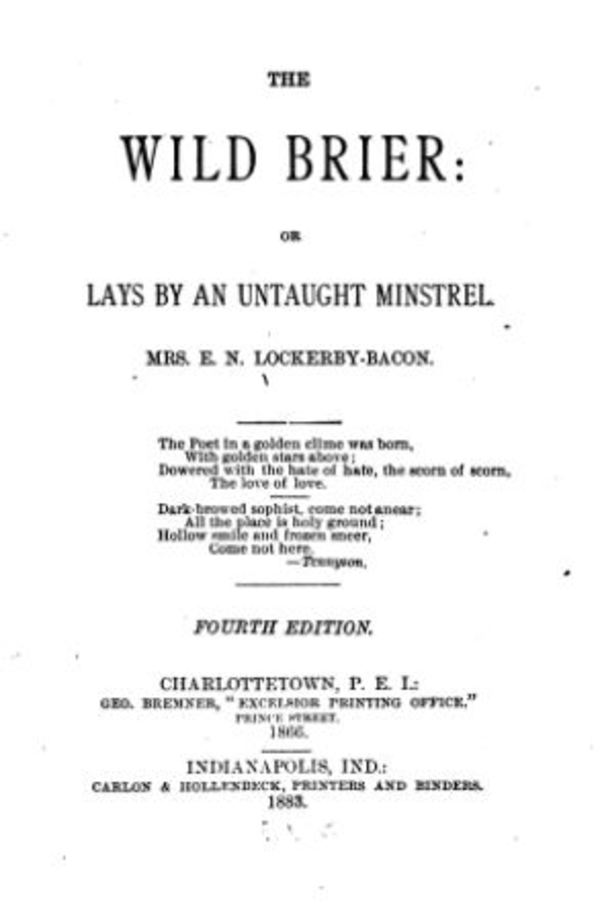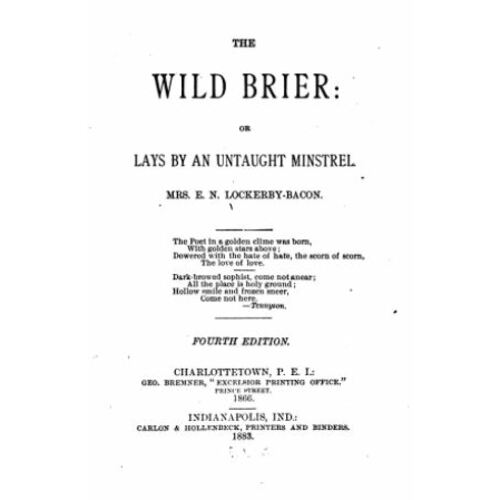
Source: Link
LOCKERBY, ELIZABETH NEWELL (Bacon), poetess; b. 12 Sept. 1831 at Cavendish, Queens County, P.E.I., sixth of 12 children of John Lockerby and Margaret Forbes; m. in 1874 Hiram Bacon; d. 6 Dec. 1884 at Indianapolis, Ind.
Elizabeth Newell Lockerby’s parents had immigrated from Scotland to the Miramichi River in New Brunswick in 1820 before settling the following year in Cavendish. There her father farmed and worked as a blacksmith. In 1862 John Lockerby retired from farming and moved to Charlottetown, accompanied by his wife and his 31-year-old daughter. Elizabeth, who had been writing poetry since her early teens, soon began to pursue a life of her own. In 1863 she attended the Provincial Training Seminary at Truro, N.S., and from 1864 to 1867 travelled frequently to Nova Scotia and New Brunswick to visit friends and relatives.
In 1866 Elizabeth Lockerby published, probably at her own expense, a volume of poetry which evidence suggests she then sold door-to-door in Charlottetown. She seems to have nurtured hopes of pursuing a career as a professional writer and to this end went to New York City in 1868, but her meagre talents and lack of literary connections and intellectual sophistication soon proved to her that she would not succeed. The following year she went to Portland, Maine, to study the life insurance business. This career was also short-lived, for in 1872 she was in Chatham, N.B., assisting her brother in his mercantile business.
In 1873 her life took a dramatic turn when she became “companion to a lady whose husband is Cashier in the National Bank of Chicago.” The following year she met and married Hiram Bacon in Chicago. Bacon, 73 years old and twice widowed, was a retired lawyer and landowner from Indianapolis, and it was in that city that the couple lived until his death in 1881. They had no children.
Elizabeth Lockerby’s reputation as a writer rests on two publications: a book of poems, The wild brier: or, lays by an untaught minstrel (Charlottetown, 1866), and a collection of poetry and prose, Oak leaves (Halifax, 1869). The first volume was reprinted in Indianapolis in 1881 and 1883, and the second was also reprinted there in 1882, all at her own expense. She may also have written some pieces for magazines and journals. The prose pieces in Oak leaves contain sentimental tragedy, lush description, or speculations on the marvel of human creation. Of her known works, the poems are most interesting. The early poems, written between 1843 and 1852, are heavily sentimental in tone and mood, with a marked tendency toward melodramatic description and narration of events. Her best known piece, “George and Amanda,” written during this period, deals with the death of a young New England sailor in the terrible hurricane of October 1851 which virtually destroyed an American fishing fleet on the north shore of Prince Edward Island. It has some effective descriptive passages:
Some boldly stood to sea, and vainly hoped
To leave the dreadful storm behind, but found
That it more fiercely broke on all sides round, – And creaking, crashing, foundered far at sea.
Some sought to gain the sheltering ports, but failed,
And on the rocks were driven, and there, with all
Their complement of men, to death went down!
Lockerby’s early poetry, though it frequently reveals the young author’s lack of artistic control over the emotional elements of her verse, does show a flair for versification and narration, and a sensitivity for human feeling. Unfortunately, she never developed the artistic skills and intellectual perceptions necessary to go significantly beyond the sentimental approach of her youthful verse. In her later poems, written between 1853 and 1869, she tempered her propensity for sentimentalism by developing a strong didactic element in her verse, as did many poets of her day. Almost inevitably, she turned to religion and morality as her main subjects. These later poems, while technically competent, are indistinguishable from the great mass of mid-19th-century religious verse published in North America and Britain.
[Elizabeth Newell Lockerby was the author of Oak leaves (Halifax, 1869; repr. Indianapolis, 1882) and The wild brier: or, lays by an untaught minstrel (Charlottetown, 1866; repr. Indianapolis, 1881, 1883). John Lockerby of Toronto supplied the author with written information on E. N. Lockerby, copies of which have been deposited with the DCB/DBC. t.b.v.]
Cite This Article
Thomas B. Vincent, “LOCKERBY, ELIZABETH NEWELL (Bacon),” in Dictionary of Canadian Biography, vol. 11, University of Toronto/Université Laval, 2003–, accessed April 2, 2025, https://www.biographi.ca/en/bio/lockerby_elizabeth_newell_11E.html.
The citation above shows the format for footnotes and endnotes according to the Chicago manual of style (16th edition). Information to be used in other citation formats:
| Permalink: | https://www.biographi.ca/en/bio/lockerby_elizabeth_newell_11E.html |
| Author of Article: | Thomas B. Vincent |
| Title of Article: | LOCKERBY, ELIZABETH NEWELL (Bacon) |
| Publication Name: | Dictionary of Canadian Biography, vol. 11 |
| Publisher: | University of Toronto/Université Laval |
| Year of revision: | 1982 |
| Access Date: | April 2, 2025 |



